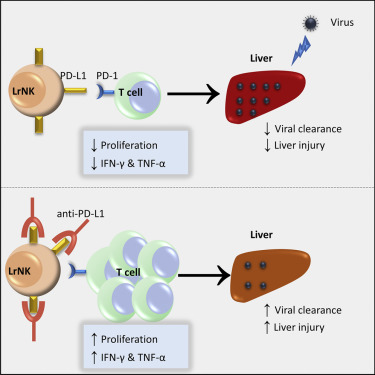Immunity ( IF 32.4 ) Pub Date : 2019-01-29 , DOI: 10.1016/j.immuni.2018.12.024 Jing Zhou , Hui Peng , Kun Li , Kun Qu , Baohui Wang , Yuzhang Wu , Lilin Ye , Zhongjun Dong , Haiming Wei , Rui Sun , Zhigang Tian

|
The tolerogenic microenvironment of the liver is associated with impaired hepatic T cell function. Here, we examined the contribution of liver-resident natural killer (LrNK) cells, a prominent hepatic NK cell compartment, to T cell antiviral responses in the liver. The number of virus-specific T cells increased in LrNK-cell-deficient mice during both acute and chronic lymphocytic choriomeningitis virus infection. Upon infection with adenovirus, hepatic T cells from these mice produced more cytokines, which was accompanied by reduced viral loads. Transfer of LrNK cells into LrNK-cell-deficient or wild-type mice inhibited hepatic T cell function, resulting in impaired viral clearance, whereas transfer of conventional NK cells promoted T cell antiviral responses. LrNK-cell-mediated inhibition of T cell function was dependent on the PD-1-PD-L1 axis. Our findings reveal a role for LrNK cells in the regulation of T cell immunity and provide insight into the mechanisms of immune tolerance in the liver.
中文翻译:

驻留肝脏的NK细胞通过PD-1-PD-L1轴控制肝T细胞的抗病毒活性
肝脏的致耐受性微环境与肝T细胞功能受损有关。在这里,我们检查了肝脏驻留自然杀手(LrNK)细胞(肝脏NK细胞的显着区隔)对肝脏T细胞抗病毒反应的贡献。在急性和慢性淋巴细胞性脉络膜脑膜炎病毒感染期间,LrNK细胞缺陷型小鼠中病毒特异性T细胞的数量均增加。感染腺病毒后,这些小鼠的肝T细胞产生更多的细胞因子,并伴有病毒载量减少。LrNK细胞转移到LrNK细胞缺陷或野生型小鼠转移抑制肝T细胞功能,导致病毒清除受损,而常规NK细胞转移促进T细胞抗病毒反应。LrNK细胞介导的T细胞功能抑制取决于PD-1-PD-L1轴。



























 京公网安备 11010802027423号
京公网安备 11010802027423号